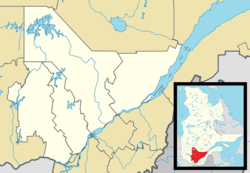Sainte-Famille-de-l'Île-d'Orléans
Sainte-Famille-de-l'Île-d'Orléans | |
|---|---|
 | |
 Location within L'Île-d'Orléans RCM | |
| Coordinates: 46°58′N 70°58′W / 46.967°N 70.967°W[1] | |
| Country | |
| Province | |
| Region | Capitale-Nationale |
| RCM | L'Île-d'Orléans |
| Settled | 1660 |
| Constituted | July 1, 1855 |
| Government | |
| • Mayor | Jean Pierre Turcotte |
| • Federal riding | Montmorency—Charlevoix —Haute-Côte-Nord |
| • Prov. riding | Charlevoix–Côte-de-Beaupré |
| Area | |
| • Total | 50.70 km2 (19.58 sq mi) |
| • Land | 50.54 km2 (19.51 sq mi) |
| Population | |
| • Total | 850 |
| • Density | 16.8/km2 (44/sq mi) |
| • Pop 2016-2021 | |
| • Dwellings | 371 |
| Time zone | UTC−5 (EST) |
| • Summer (DST) | UTC−4 (EDT) |
| Postal code(s) | |
| Area code(s) | 418 and 581 |
| Highways | |
| Website | www |
Sainte-Famille-de-l'Île-d'Orléans (Sainte-Famille prior to September 12, 2017) is a municipality in the L'Île-d'Orléans Regional County Municipality, Quebec, Canada, part of the administrative region of Capitale-Nationale. It is situated along the western shores of Island of Orléans.
Founded in 1661, Sainte-Famille-de-l'Île-d'Orléans is the oldest settlement on l'île d'Orléans and has one of the most important concentrations of houses of the old French regime.
History
[edit]In 1661, l'Île d'Orléans' first parish was formed and it was known until 1679 as Paroisse de l'Île. The parish municipality was first established in 1845 as La Sainte-Famille, abolished in 1847, and reestablished in 1855. The article 'La' disappeared in the 19th century.[1][4] A post office named Sainte-Famille-d'Orléans was opened in 1852.[5]
On September 12, 2017, the Parish Municipality of Sainte-Famille changed statutes and name to the Municipality of Sainte-Famille-de-l'Île-d'Orléans.[6]
Demographics
[edit]Population
[edit]| 2021 | 2016 | 2011 | |
|---|---|---|---|
| Population | 850 (-9.4% from 2016) | 938 (10.2% from 2011) | 851 (+0.8% from 2006) |
| Land area | 50.54 km2 (19.51 sq mi) | 48.76 km2 (18.83 sq mi) | 48.46 km2 (18.71 sq mi) |
| Population density | 16.8/km2 (44/sq mi) | 19.2/km2 (50/sq mi) | 17.6/km2 (46/sq mi) |
| Median age | 54.8 (M: 56.4, F: 52.8) | 53.5 (M: 53.4, F: 53.5) | 50.0 (M: 49.8, F: 50.2) |
| Private dwellings | 345 (total) | 445 (total) | 362 (total) |
| Median household income | $75,776 | $61,927 |
|
| ||||||||||||||||||||||||||||||||||||
| Source: Statistics Canada[12] | |||||||||||||||||||||||||||||||||||||
Language
[edit]| Canada Census Mother Tongue - Sainte-Famille-de-l'Île-d'Orléans, Quebec[12] | ||||||||||||||||||
|---|---|---|---|---|---|---|---|---|---|---|---|---|---|---|---|---|---|---|
| Census | Total | French
|
English
|
French & English
|
Other
| |||||||||||||
| Year | Responses | Count | Trend | Pop % | Count | Trend | Pop % | Count | Trend | Pop % | Count | Trend | Pop % | |||||
2016
|
930
|
915 | 98.4% | 10 | 1.1% | 0 | 0.0% | 5 | 0.5% | |||||||||
2011
|
815
|
795 | 97.6% | 10 | 1.2% | 0 | 0.0% | 10 | 1.2% | |||||||||
2006
|
805
|
805 | 100.0% | 0 | 0.0% | 0 | 0.0% | 0 | 0.0% | |||||||||
2001
|
875
|
865 | 98.9% | 10 | 1.1% | 0 | 0.0% | 0 | 0.0% | |||||||||
1996
|
875
|
875 | n/a | 100.0% | 0 | n/a | 0.0% | 0 | n/a | 0.0% | 0 | n/a | 0.0% | |||||
Cultural significance
[edit]In literature
[edit]- In The Spy Who Loved Me, Ian Fleming's ninth novel in his James Bond series, the narrator Vivienne Michel was born and raised in Sainte-Famille.
See also
[edit]References
[edit]- ^ a b "Sainte-Famille-de-l'Île-d'Orléans (Municipalité)" (in French). Commission de toponymie du Québec. Retrieved 2021-04-24.
- ^ a b "Répertoire des municipalités: Geographic code 20010". www.mamh.gouv.qc.ca (in French). Ministère des Affaires municipales et de l'Habitation.
- ^ a b "Profile table, Census Profile, 2021 Census of Population - Sainte-Famille-de-l'Île-d'Orléans, Municipalité (MÉ) [Census subdivision], Quebec". 9 February 2022.
- ^ Poirier, J. (1962). La toponymie de l'Ile d'Orléans. Cahiers de géographie du Québec, 6(12), 183–199S. See p. 194: L'article ne disparaît qu'au XIXe siècle.
- ^ Poirier 1962, p. 197.
- ^ "Interim List of Changes to Municipal Boundaries, Status, and Names, Table 1: Changes to census subdivisions by province and territory". Statistics Canada. November 14, 2018. Retrieved September 29, 2019.
- ^ "2021 Community Profiles". 2021 Canadian census. Statistics Canada. February 4, 2022. Retrieved 2022-04-27.
- ^ "2016 Community Profiles". 2016 Canadian census. Statistics Canada. August 12, 2021. Retrieved 2021-04-16.
- ^ "2011 Community Profiles". 2011 Canadian census. Statistics Canada. March 21, 2019. Retrieved 2014-04-18.
- ^ "2006 Community Profiles". 2006 Canadian census. Statistics Canada. August 20, 2019.
- ^ "2001 Community Profiles". 2001 Canadian census. Statistics Canada. July 18, 2021.
- ^ a b 1996, 2001, 2006, 2011, 2016, 2021 census

